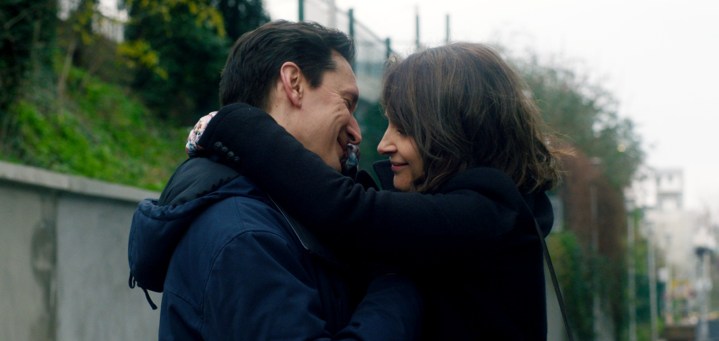There’s no premise that Claire Denis can’t shape into an obscure object of desire, no prose she can’t translate into poetry. Both Sides of the Blade, the latest stateside release from this brilliant French filmmaker, looks on the surface like the most straightforward and even commonplace of domestic dramas: The story of a middle-aged couple whose cozy life is ruptured by the reappearance of an old flame from their shared romantic past. Yet here, once more, the director of such dazzling enigmas as Beau Travail and the recent High Life has lent her material — pulled this time from a novel by Christine Angot — a beguiling and befuddling alien rhythm. Denis crams more mystery into a single transitional cut than most movies manage across their entire runtimes.
The opening minutes are suspiciously idyllic. Just as few movies that begin with a wedding end in anything but tragedy, it’s a bad sign that we first see Sara (Juliette Binoche) and Jean (Vincent Lindon) in a state of holiday bliss, splashing joyfully off an unidentified coast, before falling into passionate, carnal embrace upon return to their chicly compact Parisian flat. Their history is murkier than the crystal-clear water of this prologue. Below the surface of their contentment lurks some unfinished business, foreshadowed by the gorgeously ominous pulse of a new score by Tindersticks, Denis’s house band of choice.
Headed into work at a local radio station, Sara is struck by the sight of a man on a motorbike. She reacts as though she’s seen a ghost — which, in a manner of speaking, she has. The man is François (Grégoire Colin), the ex-lover she left a lifetime earlier for Jean. His reappearance is no coincidence. François has returned to Paris to open a sports agency, and he wants Jean, the estranged friend who seduced and then married his girlfriend, to come work with him. And why not? After all this time, it’s water under the bridge. Or so Sara and Jean tell each other. Their eyes say otherwise.

Denis doles out this backstory gradually and hesitantly, as is her wont. She is eternally allergic to exposition. Maybe detrimentally so, in this case. We learn that Jean went to prison for a time, but never why or for how long. François may have been involved, though that too is never clarified. Did Jean and Sara get together before his incarceration or after? The timeline is chronically unclear. There’s a whole subplot involving Jean’s teenage son, Marcus (Issa Perica), who lives in Vitry with his grandmother (Bulle Ogier), a custody arrangement made when his father went behind bars. These scenes graze some larger, tricky themes (Marcus is of mixed ethnicity, which seems to influence Jean’s concerns about his future) without feeling organically woven into the fabric of the movie’s slow-simmering marital conflict.
As usual, Denis is more concerned with emotional than narrative logic. Our map through this thicket of vagaries is the performances of her stars, neither new to the challenges and rewards of a layover in this director’s sensuous City of Lights. The body betrays what the tongue won’t reveal — a subtext of so many of Denis’s dialogue-light dramas. (Is there a living filmmaker more capable of giving an exposed shoulder blade emotional context?) These spouses tell on themselves, communicating the tensions concealed in evasive exchanges. You could say that Binoche and Lindon, old pros at scrawling secret messages across the canvases of their faces, are playing the notes between the notes. Which doesn’t preclude the occasional eruption: Binoche’s ripples of panic-attack desire as François re-intrudes on her life and thoughts, the way Jean’s midlife chill shatters into frothing rage during the climactic shouting match.
Both Sides of the Blade has none of the nonlinear incomprehensibility of Denis’s most confounding work, like the puzzle-box thriller The Intruder. All the same, its elisions keep you on the edge of understanding — that acquired taste of intellectual labor familiar to any fan of this great director. What’s thrilling about the movie is the way Denis uses arrhythmic editing to subtly disorient, expressing the destabilization of a marriage in formal terms. Jump cuts mark conversational pivots not detectable in the actual dialogue, while encounters across multiple hours or even days are stacked on top of each other to create jarring juxtapositions in tone. The film’s surreal centerpiece is the reunion between Sara and François at a public event—a sequence of such Lynchian dreamlike dread that it nearly throws the reality of the events depicted under suspicion. Can everything we see even here be trusted?
Speaking of François, he never coalesces into a recognizable personality, into any shade of character. That’s by design: He’s less man than ephemeral wisp of memory — the skeleton in the closet of this seemingly happy union, the inescapable past pulled into the vague shape of a person. In the end, what happens between Sara and Jean has little to do with him. Both Sides of the Blade is really about an elephant in the room finally being addressed, and about the ways that the mature, adult reaction to a situation can be a lie to avoid addressing the core of one’s feelings. Denis, poet of the unsaid, understands the way people talk around what they really mean. The truth lies in the space between their words, a chasm closed by the director’s ecstatically puzzling style.
Both Sides of the Blade is now playing in select theaters. For more reviews and writing by A.A. Dowd, visit his Authory page.



